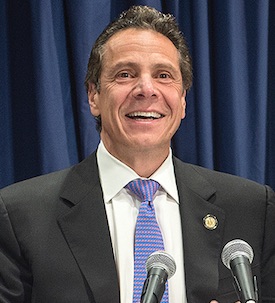By Johnny Kampis
State leaders in New York appear to finally be ready to legalize online sports betting, but critics don’t care for the approach of having a likely high tax rate and state government monopoly.
After long expressing his disdain for online bets, Gov. Andrew Cuomo has changed his mind as the state looks to patch a massive $8.7 billion budget hole brought on by the COVID-19 pandemic.
But rather than open up the operations to the free market, Cuomo looks to clamp down tightly and control the process. His plan would use the state lottery commission to license specific gambling sites that would agree to share most of the revenue with the state, the New York Post reported.

New York Gov. Andrew Cuomo
Sports betting in New York is now limited to in-person wagers at four commercial casinos and other facilities owned by Native American tribes. Cuomo plans to direct the New York State Gaming Commission to solicit bids for a limited number of mobile sports betting operators.
“Many states have done sports betting, but they basically allow casinos to run their own gambling operations,” Cuomo said. “That makes a lot of money for casinos, but it makes minimal money for the state and I’m not here to give the casinos a lot of money. I’m here to raise funds for the state, so we have a different model for the state.”
The Post pointed out in an op-ed that limiting the places in which participants can place bets hurts consumers. “New York would limit options — and have every reason to license those offering the best odds for the state, not the bettor,” the op-ed said.
Ulrik Boesen, senior policy analyst at the Tax Foundation, shared a similar sentiment with the Taxpayers Protection Alliance (TPA), noting that less competition leads to worse odds for gamblers.
New York Budget Director Robert Mujica projects that the state would reap $500 million in tax revenue and that for bettors “it’s seamless and it’s exactly the same.”
But Boesen notes that part of New Jersey’s success is due to siphoning off players from New York. While the Empire State expects to capture those customers with its online betting operation, Beeson said that is far from guaranteed.
“If the product is better in New Jersey why would they switch?” he asked.
At least one lawmaker in New York shares those concerns. State Sen. Joe Addabbo, D-Queens, chairman of the state Senate’s Racing, Gaming and Wagering Commission, told the Wall Street Journal that New York shouldn’t limit the online sports betting business to a single state-selected operator.
“I am not a believer that one sportsbook provider, or operator, can handle the volume in New York,” he said. “I don’t think it’s good for the consumer — I think you’re pushing the consumer to New Jersey or to an illegal site.”
Boesen told TPA that he doesn’t think the $500 million figure is realistic, for additional reasons. Although New York state leaders haven’t specified the likely tax rate, Morgan Stanley analyst Thomas Allen said he anticipates the state will adopt a tax rate closer to Pennsylvania (36 percent) than New Jersey (14.25 percent).
Boesen said even if New York adopted a 50 percent tax rate, he doesn’t see the state reaching a half-billion dollar mark. Using New Jersey as a benchmark, he ran the numbers, adjusting the revenue for the difference in population (nearly 9 million in New Jersey to nearly 19.5 million in New York) and found that at a 50 percent tax rate New York would capture $440 million in taxes in a year.
“I think there are a lot of ifs and buts surrounding the governor’s plan in New York,” Boesen said.
Johnny Kampis is a senior fellow and investigative reporter for the Taxpayers Protection Alliance.


